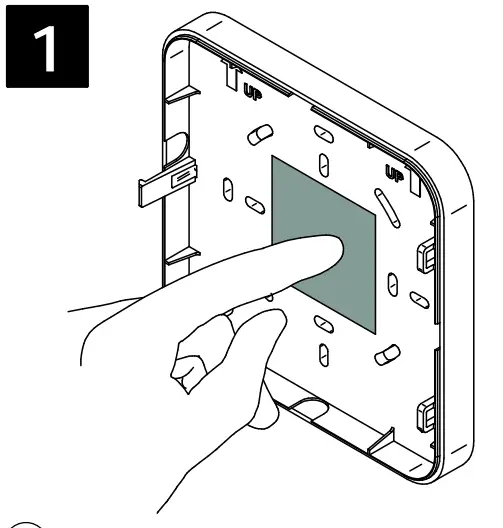SALTO IQ3.0 Gateway Device System

Dimension
![]() The IQ3 is a Gateway device that ensures the communication between Nebula and the SALTO Bulent devices providing the SVN (SALTO Virtual Network) features.
The IQ3 is a Gateway device that ensures the communication between Nebula and the SALTO Bulent devices providing the SVN (SALTO Virtual Network) features.
It is equipped with an Ethernet, WIFI (*), Bluetooth and RS-485 interface. (*) Depending on the model.

Installation
EUROPE EUROPA

NORTH AMERICA

SWISS

CEILING/WALL INSTALLATION WITH HIDDEN CABLE

Remove!


CEILING/WALL INSTALLATION WITH EXPOSED CABLE







DESKTOP INSTALLATION





SEE WIRING DIAGRAM
Wiring
A. ETHERNET MODEL

B. ETHERNET + POE MODEL

C. ETHERNET + WIFI MODEL

( * )Not included
![]() ETHERNET MODEL
ETHERNET MODEL
Plug


![]() ETHERNET + POE MODEL
ETHERNET + POE MODEL
Plug


If there is no PoE infrastructure, use auxiliary power supply
Plug

ETHERNET + WIFI MODEL
Plug

If you do not connect to a WIFI network, connect the Ethernet cable.
Plug

COMMUNICATION WIRING DIAGRAM IN IQ3/SALTO Node
RS485 CONNECTION TO TERMINAL

![]() RS485 bus termination resistor is needed (ON position) when the node is located at the end of the bus.
RS485 bus termination resistor is needed (ON position) when the node is located at the end of the bus.

RS485 CONNECTION WITH CABLE JACK


Product Overview
- Power (except PoE).
- Ethernet.
- RS485 (Jack cable).
- RS485.

Electrical Features
| EXTERNAL POWER SUPPLY CHARACTERISTICS | |||
| Min | Max | Typ | |
| Input Voltage | 12-5%V | 12+5%V | 12V |
| Max Input Power | 15w | ||
| Current Consumption* | 200mA | 60mA | |
* Excluding RS485 Nodes.
Power supply must be calculated taking into account SALTO Nodes current consumption.
| PoE |
| PoE Norms: IEEE 802.3af / IEEE 802.3at |
| PoE Class0 |
| OPERATING CONDITIONS | ||
| Min | Max | |
| Temperature | 0ºC | 60ºC |
| Humidity | 0 | 95% (Non condensing) |
| WIFI CHARACTERISTICS | |
| Frequency Range | 2400 MHz to 2483.5 MHz |
| Standard | IEEE 802.11b/g/n compliant |
| TX power | 16dBm |
| Range | 25-30m * |
- Depending upon installed environment. To ensure correct operation, do not install the device near a metallic surface.
| SALTO Bulent CHARACTERISTICS | |
| Frequency Range: 2400 MHz to 2483.5 MHz | |
| Standard | Bluetooth 5.2 Compliant |
| TX power | 8dBm |
| Indoor Range | 5-10m * |
- Depending upon installed environment. To ensure correct operation, do not install the device near a metallic surface.
| MAX. NUMBER OF DEVICES TO BE CONNECTED |
| SALTO Nodes: 6 |
| Access points: 112 |
Configuration
- The device is configured using the Nebula App.
- Ethernet test: without any type of set up, the IQ3 is a DHCP ready device. If your network supports it, it is possible to check the Ethernet connectivity by pinging the address SALTO-IQ3-XXXXXX(XXXXXX corresponds to the final 6 digits of MAC).
Installation example
Maximum number of SALTO Nodes: 6
Maximum number of access points: 112
SALTO´ s Software

(*) Depending upon installed environment.
Signals
| LED MODE | LED COLOUR | STATUS INDICATION |
| Blink long RED | Device ex works. It will be doing advertising. | |
| Blink short RED (3 seconds) | Identification signal when selected from a mobile phone. The signal lasts 3 second. | |
| Blink long BLUE | Device initialized with communication to the server. | |
| Blink short YELLOW | Device not communicating with the server. | |
| Blink long GREEN | Connection established to a mobile phone. | |
| Blink short GREEN | Initialized and in programing mode. It is doing advertising while waiting for a mobile connection. |
Operational test
- Check that the red light turns on.
- If you have connected to Ethernet, check that the lights on the RJ45 turn on.
All contents current at time of publication.
SALTO Systems S.L. reserves the right to change availability of any item in this catalog, its design, construction, and/or materials.

Documents / Resources
 |
SALTO IQ3.0 Gateway Device System [pdf] Installation Guide IQ3.0 Gateway Device System, IQ3.0, Gateway Device System, Device System, System |